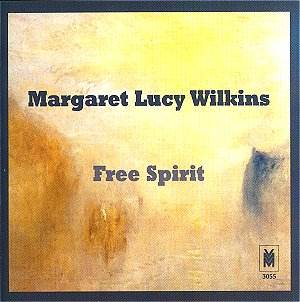The English composer Margaret Lucy Wilkins is a member
of the music staff at Huddersfield University. Not unexpectedly, her
music has often appeared at the Huddersfield Contemporary Music Festival,
but has also been heard at similar events throughout the western world.
However you feel about the actual nature of her music,
it has to be said straight away that this is a highly impressive issue.
The standard of both performance and recording is very high, and there
are notable contributions from Barrie Webb, who is the brilliant trombonist
in 366" as well as the conductor of two items, and from
soprano Alison Wells.
What of the music? Well, it’s certainly challenging;
I have to say that there are moments when I wonder who music like this
is for. I mean that seriously, not necessarily as a criticism. Sometimes,
as the listener, you feel it is being aimed at you rather than
provided for any kind of enjoyment, and I imagine the players may feel
at least something of the same sense of embattlement. There is an almost
adolescent grumpiness and aggression about some of it, which is tiring,
but can be overcome by stretching out one’s listening - not listening
to too much at one go.
Which raises another point; this music surely has a
strongly theatrical and therefore visual element, meaning that a CD
can only partially convey its essence. Ironically, repertoire like this
would best be served by video or DVD, but is just the last kind
of thing that recording companies, conscious of rapidly diminishing
profit margins, are likely to invest in. But you do need an imaginative
response - willingness in this regard to meet the music halfway. There
is no denying Wilkins’ imagination for textures, and she has the commitment
and ability to see her ideas through – a real composer, there’s no doubt
about it, and one with a distinctive voice and personality.
Musica Angelorum, for string orchestra, is
based on the intriguing idea of the sort of music the bands of angels
seen in mediaeval paintings might be imagined to be playing. It begins
with widely spaced musings on a triad of A major, then diversifies and
enriches, seeming to come closer, then move away again, finally disappearing
into the ether. My mind came up with a most strange comparison – the
Act I Prelude of Wagner’s Lohengrin! The concept is the same
though delivered through an entirely different musical vocabulary.
Struwwelpeter is huge fun – if you like this
kind of thing … and I must say I do. It is basically expressionistic
in style, with shrieking clarinets and wailing vocal glissandi that
bring it close to the world of, for example, Peter Maxwell Davies’ Mad
King songs. The verses, translations of German texts by Dr. Heinrich
Hoffmann, are delightfully macabre. They deal with the slovenly figure
of Struwwelpeter himself; the sinister Cruel Frederick;
little Harriet, who sets fire to herself with a box of matches;
Augustus, who rejects food and wastes away rapidly; the racist
Inky Boys, who attack a ‘black-a-moor’; and finally Flying
Robert, who unadvisedly goes out on a stormy day and gets
blown away hanging on to his own umbrella! Wonderful stuff, and Wilkins
is more than equal to the black humour. I loved the ‘pussy-cats’ who
are alarmed at Harriet’s antics with the matches, and the sly references
to the Offenbach Barcarolle in the clarinets (these poems are,
of course, ‘tales of Hoffmann’, though in her very straight-faced note,
the composer ascribes this quotation to a link with the Nazi death-camps).
And the depiction of Flying Robert borne aloft with his umbrella,
like some horrifically distorted Mary Poppins, is hilariously portrayed
by concerted upward glissandi from the three clarinets – most uplifting
(sorry). Alison Wells is the highly accomplished soloist.
Of Burnt Sienna: Etude for String Trio,
Wilkins writes, curiously, that "though it is not tonal, it centres
around ‘A’". I would ask (politely) how can music be ‘not tonal’
if it has a tonal centre? It may not be ‘in a key’ but that is, to me,
a very different matter. Be that as it may, this is another impressive
piece, with, to my ears, more than a mere flavour of Bartók in
the string textures, and in the sinuous melody for high violin.
366" is not related in any way to a certain
piece by John Cage. It is simply intended to last precisely six minutes
and six seconds. (Why? Is there a Satanic connection here?!) Among the
works it will inevitably be compared with are Berio’s clown-inspired
Sequenza, or Arne Nordheim’s superb Hunting of the Snark.
Wilkins’ little work has the same wit and imagination, and is very carefully
and convincingly constructed. Barrie Webb gives a stunningly assured
performance.
Finally, the Symphony. This is quite a large-scale
structure, with three movements entitled Exposition, Juxtaposition,
Opposition. It’s a powerful work, though it does have the problem
of much recent music, namely a difficulty getting moving, of acquiring
momentum, of becoming really fast. The final section intends
to do that, but somehow never does. Textures sometimes recall Messiaen,
at other times Ligeti. I am looking forward to hearing it again – it
undoubtedly stays in the memory. This is a tribute in itself, when so
much contemporary music, full of empty gestures and technical ‘wizardry’
is instantly forgettable.
It would be wonderful if more British universities
had senior music staff writing such intelligent, individual music. My
congratulations to everybody who worked on the major project that this
recording represents.
Gwyn Parry-Jones
